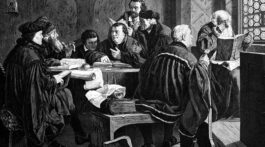When God created the world, He did it with a great deal of enthusiasm.
However, that wasn’t enough. In Genesis 2 another descriptive name was given: LORD or Yahweh conveyed that He was also compassionate and trustworthy. The full meaning of those names would soon be seen when sin entered. God was indeed trustworthy.
GOD’S ORIGINAL GIFT
God’s gift to humans was not only creating them in His image it included His continued presence. Regardless of the detour caused by sin, despite the spiritual and physical condition of humanity, God promised not to leave.
The Bible clearly expresses the value of every individual. That value is not derived from what a person can or cannot do. Their worth comes from God and is respected by God to such an extent that He radically invested Himself for their redemption (John 3:16). Life is sacred, and it is only God who is in the position to determine one’s ultimate right to live.
God is our identity both as individuals and as His church “body” (1 Corinthians chapter 12). Our identity from God’s perspective is based on who He is and the value He has placed in each person. Diversity does not detour His love; it is divinely inherent in the human DNA.
Seeking to Understand
The World Health Organization reports that one in seven, or 15 percent of the world’s population, has a significant disability.1 The way we understand disabilities is critical. It influences the way we treat these individuals. What is not always understood, however, is that our treatment of them frequently shapes their own perception of their worth.
Aimee Mullins was born without fibula bones in her shins. Her legs were amputated below the knee when she was a year old. She asks for no sympathy. She is a fashion model with prosthetic legs. She reminds us, “I want to be seen as beautiful because of my disability, not in spite of it.”2
Educator and author Stephen Covey shares that the single most important principle he has learned about interpersonal communication is to “seek first to understand and then to be understood.”3
However, if understanding is to be effective, it must be from the other person’s perspective. Hearing persons, for example, can easily misunderstand the life of a deaf person. To conclude that deaf people are isolated, disoriented, and uncommunicative and live in a world without meaning would be wrong.
Such a conclusion almost begs for the deaf to be treated with sympathy. This is a false assumption.
One writer points out, “In the hearing stereotype, deafness is the lack of something, not the presence of anything.”4 In reality, the deaf see their situation as a culture more than a disability. Their culture is filled with history, values, behaviors, art, and its own language. As is so often the case, if we don’t have the right starting point, it is not possible to fully appreciate the differences that do exist.
THINK POSSIBILITIES
How we see diversity and how we relate to others begins with the way we think. The German philosopher Johann Gottfried Herder observed in the 18th century that we cannot know ourselves without a reference point outside of ourselves. That reference point is Jesus. Any source other than our Creator and Redeemer will lead to destructive relationships and the depreciation of the unique contribution those who are not like us can make. To get it right, we must start right.
The apostle Paul knew it was possible to change perceptions. He could personally say after becoming “a new creation” in Christ that believing makes it possible to see differently. “So from now on we regard no one from a worldly point of view” (2 Cor. 5:16, NIV).
The story is told of Lawrence, a deacon in Rome in the third century. He understood not only the concept of diversity but also the unique value of every person. During the persecution of the early church, Lawrence was given a position of trust. He cared for the treasury and riches of the church and the distribution of alms to the poor. At the beginning of August 258, Emperor Valerian issued an edict that all bishops, priests and deacons should immediately be put to death.
The emperor demanded that Lawrence turn over the riches of the church. Early historical records indicate that he asked for three days to gather the wealth. During those three days, he distributed as much of the church’s treasury to the poor as possible. On the third day, he appeared before the prefect or regional governor. When ordered to hand over the treasures of the church, Lawrence presented the poor, the crippled, the blind, and the suffering, and declared that these are the true treasures of the church. He reportedly said to the prefect, “The Church is truly rich, far richer than your emperor.” This act of defiance led to his martyrdom.
What Lawrence believed and taught at the peril of his own life was a timeless truth: “Those whom we believe are the students often become our teachers.” Diversity of all kinds provides lessons needed for our character development.
Ellen White suggested the same when she wrote, “I saw that it is in the providence of God that widows and orphans, the blind, the deaf, the lame, and persons afflicted in a variety of ways, have been placed in close Christian relationship to His church; it is to prove His people and develop their true character. Angels of God are watching to see how we treat these persons who need our sympathy, love, and disinterested benevolence. This is God’s test of our character.”5
I’ve learned that differences are important. Along with Aimee Mullins and a billion others who make up God’s family, I have discovered that God appreciates uniqueness. Indeed, God’s gifts come in many shapes, forms, colors, races and perspectives.
1 World Health Organization, December 1, 2020 (www.who.int/news room/facts-in-pictures/detail/disabilities)
2 Andrew Solomon, Far From the Tree: Parents, Children, and the Search for Identity, p.37.
3 Stephen R. Covey, The Seven Habits of Highly Effective People: Powerful Lessons in Personal Change, p. 237.
4 Harlan Lane, The Mask of Benevolence: Disabling the Deaf Community,
- 7.
5 Ellen White, Testimonies for the Church, vol. 3, p. 511.
Larry R. Evans has served as a pastor, church planter, and administrator at the local church, conference, division, and General Conference. He is now assistant to the GC President for Adventist Possibility Ministries, which includes Bereavement for Spousal Loss, Blind and Low Vision, Caregiver Support, Deaf and Hard of Hearing, Mental Wellness and Learning Development, Orphans and Vulnerable Children, and those with Physical/Mobility Challenges. He is motivated by God’s grace and cares deeply for those who do not claim Jesus as their special Friend and Savior and who have been marginalized by church and society.
Reprinted with permission from the author
Roberto Correa serves as Possibility Ministries director for the Mid-America Union.










